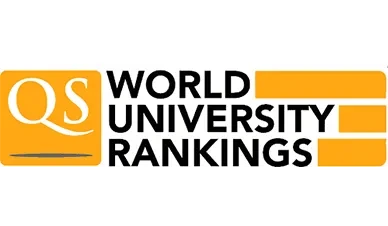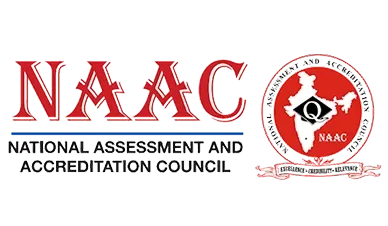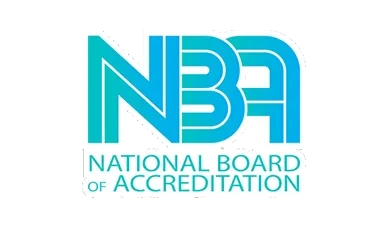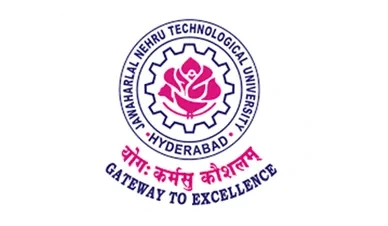Department Overview
Electrical and Electronics Engineering has an enormous and widespread impact on our daily lives. From power stations to electric vehicle charging, telecom networks to computing infrastructures, electronic systems, the world of entertainment and industry are designed and operated by Electrical Engineers. Hence, Electrical and Electronics becomes a core branch of Engineering, creating the technology and systems of the future demands vision and technical expertise.
The department of Electrical and Electronics Engineering was established in the year 2011, with an annual intake of 60 students, and is fully equipped with a state-of-art laboratories with latest equipment, advanced versions of software and demo units. The laboratories are developed in consultation with the Industry and Academic experts to provide industrial environment along with the University curriculum. The department has rich experienced and dedicated faculty with the background of Industry, Teaching and Research. The faculty is specialized in the areas of Power Electronics, Power Systems, Energy Systems, Instrumentation and Control Systems to provide excellent knowledge in the core subjects.
The Department organized various Development Programmes related to students and faculty members, Seminars, Industrial visits and Expert lectures from Industry and Research institutions to mould enthusiastic students into excellent engineers, while exposure to the latest technologies fosters the creativity and independent thinking of students. The department has developed strong links with Industry, Academic and Research organizations.
The Department of Electrical and Electronics Engineering has an excellent reputation for both its teaching and R&D in Energy Auditing, Solar and Consulting Projects with various organizations.
Highlights of the Department
High qualified and experienced faculty
Enrollment of high caliber students.
MS Program with Campbellsville University, Kentucky, USA
Excellent pre-placement training for students from 2nd year onwards.
Digital Library Facility for students as well as faculty members
Conducive environment for Academic Excellence
Effective Teaching & Learning Process
State of the art computing facilities for R&D and innovation
Centres of Excellence
Industry training and campus placements
Add-on Courses
Organizing extra-curricular and co-curricular activities.
Vision
To be a leading department of Electrical and Electronics Engineering for Technical Excellence where Learning and Research integrate to sustain society and industry
Mission
M1: Nurture professionals to foster their intellectuals for national growth, and contributing to progress, embodying knowledge, skill, ethics and dedication.
M2: Promote academic growth by offer ingstate-of-art programs for students and faculty to reach international standards.
M3: Sustain performance by excellence inteaching, research and innovations and to address emerging national and global issues for the well-being of society.
M4: Establish extensive partnership and collaborations with foreign universities to advance technology education.
PROGRAM EDUCATIONAL OBJECTIVES (PEOs)
PEO-1: Graduates shall have the ability to apply knowledge across the Branches and in emerging areas of Electrical and Electronics Engineering for higher studies, research, employability and handle realistic problems.
PEO-2: : Graduates shall have good communication skills to possess ethical conduct and a sense of responsibility to serve society and protect the environment.
PEO-3: Graduates shall have strong academics, polished soft skills, managerial expertise, and leadership qualities, and value lifelong learning, vital for successful careers and entrepreneurship.
PROGRAMME SPECIFIC OBJECTIVES
PSO 1: Able to apply the knowledge gained during the course of the program from Mathematics, Basic Computing, Basic Sciences and Social Sciences in general and all electrical courses in particular to identify, formulate and solve real life problems faced in industries and/or during research work.
PSO 2: Able to provide socially acceptable technical solutions to complex electrical engineering problems with the application of modern and appropriate techniques for sustainable development.
PSO 3: Able to apply the knowledge of ethical and management principles required to work in a team as well as to lead a team
PROGRAM OBJECTIVES (POs)
Engineering Graduates will be able to:
1. Engineering knowledge: Apply the knowledge of mathematics, science, engineering fundamentals, and an engineering specialization to the solution of complex engineering problems.
2. Problem analysis: Identify, formulate, review research literature, and analyze complex engineering problems reaching substantiated conclusions using first principles of mathematics natural science, and engineering sciences.
3. Design/development of solutions: Design solutions for complex engineering problems and design system components or processes that meet the specified needs with appropriate consideration for the public health and safety, and the cultural, societal, and environmental considerations.
4. Conduct Investigations of complex problems: Use research-based knowledge and research methods including design of experiments, analysis and interpretation of data, and synthesis of the information to provide valid conclusions.
5. Modern tool usage: Create, select, and apply appropriate techniques, resources, and modern engineering and IT tools including prediction and modeling to complex engineering activities with an understanding of the limitations.
6. The engineer and society: Apply reasoning informed by the contextual knowledge to assess societal, health, safety, legal and cultural issues and the consequent responsibilities relevant to the professional engineering practice.
7. Environment and sustainability: Understand the impact of the professional engineering solutions in societal and environmental contexts, and demonstrate the knowledge of, and need for sustainable development.
8. Ethics: Apply ethical principles and commit to professional ethics and responsibilities and norms of the engineering practice.
9. Individual and team work: Function effectively as an individual, and as a member or leader in diverse teams, and in multidisciplinary settings.
10. Communication: Communicate effectively on complex engineering activities with the engineering community and with society at large, such as, being able to comprehend and write effective reports and design documentation, make effective presentations and give and receive clear instructions.
11. Project management and finance: Demonstrate knowledge and understanding of the engineering and management principles and apply these to one's own work, as a member and leader in a team, to manage projects and in multidisciplinary environments.
12. Lifelong learning: Recognize the need for, and have the preparation and ability to engage in independent and lifelong learning in the broadest context of technological change.
Departmental Advisory Board
| S.No | Name | Designation | Role |
|---|---|---|---|
| 1 | Dr Nagaraja Kumari CH | Head of the Department | Chairman |
| 2 | Mr. T. Manidhar | Assistant Professor, EEE | Coordinator |
| 3 | Dr. B. Mangu | Professor, Department of Electrical Engineering, University College of Engineering(A), Osmania University, Hyderabad | Academic Expert |
| 4 | Dr. Narasimharaju B L | Professor &HoD of EEE, NIT Warangal | Academic Expert |
| 5 | Mr. Mushtaq Ahmed | Director, Sure Energy Systems, Hyderabad | Industry Expert |
| 6 | Mrs. S. Vasanthi | Associate Professor, ECE | Member |
| 7 | Dr. B. Madhusudana Reddy | Professor, MBA | Member |
| 8 | Mr. K. Vishnu Vamshi | HR, TCS, Hyderabad | Alumni |
| 9 | Ms. K. Aakanksha | Student Nominee | Member |
| 10 | Ms. A. Harshini | Student Nominee | Member |
Departmental Academic Committee
| S.No | Name | Designation | Role |
|---|---|---|---|
| 1 | Dr. Nagaraja Kumari CH | Associate Professor and Head of the Department | Chair Person |
| 2 | Mr. T Manidhar | Associate Professor | Program Chair |
| 3 | Mr. Ch. Sriram | Assistant Professor | Co-ordinator |
| 4 | Mr. R Jagan | Assistant Professor | Module Co-ordinator |
| 5 | Mr. M Srikanth | Assistant Professor | Module Co-ordinator |
| 6 | Mr. A Tirupathi | Assistant Professor | Course Co-ordinator |
| 7 | Mrs. MD.Samreen Sulthana | Assistant Professor | Course Co-ordinator |
UG
B.Tech in Electrical and Electronics Engineering - 60
| Program Structure | |
|---|---|
| Program : | B.Tech |
| Duration : | 4 years |
| Eligibility Criteria : | 10+2 Science stream (Physics & Mathematics) |
| Selection Procedure : | Entrance Test |
HOD Message
Dear parents and Students,
Thank you for showing your interest in Department of Electrical and Electronics Engineering.
I hope you enjoy reading about the exciting things that have been happening recently in the field of Electrical and Electronics Engineering. The people across the world are able to connect in no time because of fast growth in this field. This field of engineering and technology has major contribution to the society which we are enjoying and witnessing today. This importance makes Electrical and Electronics Engineering branch to stay ever green on top of all other Engineering braches as well.
My sincere thanks to the management, Managing Director, Principal, all my faculty members and all my students for supporting me at every point to keep the department in high esteem
With Best Wishes,
Dr. Nagaraja Kumari CH
HOD – EEE, GNIT
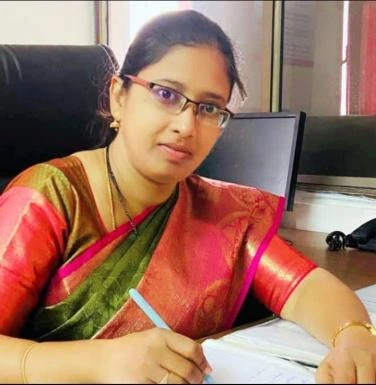
HOD Profile
Dr. NAGARAJA KUMARI. CH is working as a Professor & Head of the Department – Electrical and Electronics Engineering at Guru Nanak Institute of Technology, Hyderabad. She has completed her Ph. D in Electrical and Electronics Engineering, M. Tech Degree in Power Systems Engineering and B. Tech Degree in Electrical and Electronics Engineering from Nagarjuna University in the years 2018, 2007and 2004 respectively. She has a teaching experience of more than 17 years. She has published 12 technical papers in various reputed international journals and 09 international and national conferences. She has organized 07 FDPs/Workshops which include AICTE training and learning (ATAL) Sponsored. She has participated about 33 seminars/conferences/symposiums as a panel member. She has attended 18 FDPs in various colleges and NITs. She is serving as a reviewer for various international reputed journals like IET Generation Transmission and Distribution and also for springer international conferences on communication systems and networks. She acted as a Resource Person for various technical events includes ATAL Academy Sponsored. Her areas of interest includes Power Systems, Smart Grid Applications, FACTS and Control Systems and Renewable Energy Sources. She is a life member in ISTE and member of IEEE.

Dr. Nagaraja Kumari CH
HOD – EEE, GNIT
Faculty Profiles
| S.No. | Name of the Faculty | Qualification | Designation |
|---|---|---|---|
| 1 | Dr. Nagaraja Kumari CH | Ph.D. | Professor & Head of the Department |
| 2 | Mr. T. Manidhar | M.E., (Ph.D.) | Associate Professor |
| 3 | Dr. Ch. Sriram | Ph.D. | Assistant Professor |
| 4 | Mr.R. Jagan | M. Tech., (Ph.D.) | Assistant Professor |
| 5 | Mrs. MD. Samreen Sulthana | M. Tech. | Assistant Professor |
| 6 | Ms. J. Kiranmayee | M. Tech., (Ph.D.) | Assistant Professor |
| 7 | Ms. R. Thanuja | M. Tech | Assistant Professor |
| 8 | Mr. A. Thirupathi | M. Tech., (Ph.D.) | Assistant Professor |
| 9 | Mr.D.Yesuraja | M. Tech | Assistant Professor |
| 10 | Mr.D.Sreenadh Reddy | M. Tech., (Ph.D.) | Assistant Professor |
| 11 | Dr. M. Naresh | Ph.D. | Assistant Professor |
| 12 | Mr.M.Sreekanth | M. Tech., (Ph.D.) | Assistant Professor |
| 13 | Mrs.P.Harika Reddy | M. Tech., (Ph.D.) | Assistant Professor |
| 14 | Mrs.B.Roja | M. Tech. | Assistant Professor |

Dr. NAGARAJA KUMARI. CH is working as a Professor & Head of the Department – Electrical and Electronics Engineering at Guru Nanak Institute of Technology, Hyderabad. She has completed her Ph. D in Electrical and Electronics Engineering, M. Tech Degree in Power Systems Engineering and B. Tech Degree in Electrical and Electronics Engineering from Nagarjuna University in the years 2018, 2007and 2004 respectively. She has a teaching experience of more than 17 years. She has published 12 technical papers in various reputed international journals and 09 international and national conferences. She has organized 07 FDPs/Workshops which include AICTE training and learning (ATAL) Sponsored. She has participated about 33 seminars/conferences/symposiums as a panel member. She has attended 18 FDPs in various colleges and NITs. She is serving as a reviewer for various international reputed journals like IET Generation Transmission and Distribution and also for springer international conferences on communication systems and networks. She acted as a Resource Person for various technical events includes ATAL Academy Sponsored. Her areas of interest includes Power Systems, Smart Grid Applications, FACTS and Control Systems and Renewable Energy Sources. She is a life member in ISTE and member of IEEE.
Mr.MANIDHAR THULA Received His B.Tech Degree In Electrical And Electronics Engineering From Jntu, Hyderabad, And An M.E. In Industrial Drives & Control From The College of Engineering, Osmania University, Hyderabad. He Is Currently Pursuing A Ph.D. And Serves As An Associate Professor In The Department of Electrical And Electronics Engineering At Guru Nanak Institute of Technology, Hyderabad.With Over 14 Years Of Academic Experience, Including 13 Years In Teaching And 2 Years In The Industry, He Has A Diverse Professional Background. He Has Published More Than 12 Papers In International Journals, Authored 1 Book, And Has 2 Published Patents. His Research Interests Include Electrical Drives, Renewable Energy Systems, And Energy Management.

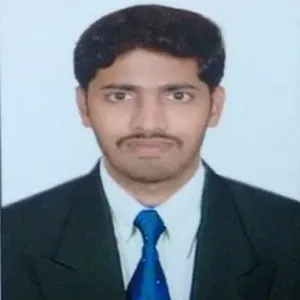
Dr. CHOLLETI SRIRAM is an Assistant Professor in the Department of Electrical & Electronics Engineering at Guru Nanak Institute of Technology, Hyderabad. He earned his Ph.D. in Electrical & Electronics Engineering from Koneru Lakshmaiah Education Foundation (KLEF) in 2023. He completed his M. Tech. in Power Electronics with Distinction from VNR Vignan Jyoti Institute of Engineering and Technology, Autonomous, in 2013, and obtained his B.Tech. in Electrical & Electronics Engineering from Jawaharlal Nehru Technological University. With 8 years of teaching experience, Dr. Ch. Sriram has made significant contributions to research, publishing 14 international journal papers and securing four patents. He is also the author of the textbook Renewable Energy Systems - Integration and Optimization. His research interests include distance relay protection, machine learning algorithms for power system protection, and power system stability.
Mr. RAMPALLI JAGAN is working as an Assistant Professor in the Department of Electrical & Electronics Engineering at Guru Nanak Institute of Technology, Hyderabad. He completed his B.Tech. in EEE from Jawaharlal Nehru Technological University, in 2007, M. Tech. Power Electronics with Distinction from PIRM college, JNTUH in 2014, and pursuing his Ph.D. in EEE from JNTUH University. He has 12 years of teaching experience. He has published 10 international journals and published 1 patent. His research interests include Power electronics, semiconductor switches, Renewable energy sources and Power electronics drives.
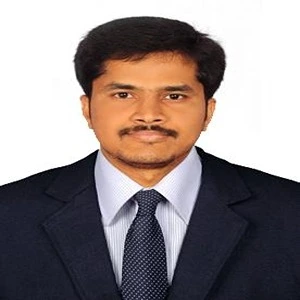

Mrs. MD. SAMREEN SULTHANA is working as an Assistant Professor in the Department of Electrical & Electronics Engineering at Guru Nanak Institute of Technology, Hyderabad. She completed her B. Tech in EEE from JNTUH in 2012, M. Tech in Electrical Power Systems with Distinction from Jawaharlal Nehru Technological University Hyderabad in 2014. She has 11 years of Teaching experience. She has published 3 International Papers and four patents.
Mrs.KIRANMAYEE J is working as Assistant Professor in the Department of Electrical and Electronics Engineering at Guru Nanak Institute of Technology, Hyderabad. She completed her B. Tech EEE from Madhira Institute of Technology and Science, JNTUH in 2011, M. Tech EEE with Distinction from ST Mary’s Engineering College, JNTUH in 2016. She has 8 years of teaching experience. She has published 3 international journals and 1 International Conference.

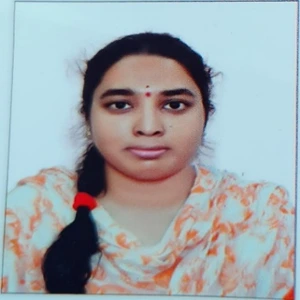
Ms. R. THANUJA is working as Assistant Professor at Guru Nanak Institute of Technology in Hyderabad. She completed her B. Tech Electrical and Electronics Engineering in AnuBose Institute of Technology from JNTUH in 2014, M. Tech Power Electronics in AnuBose Institute of Technology with Distinction from JNTUH. She had 6 years of teaching experience. She has published 2 technical papers in various reputed international journals.
Mr. AGOLAPU THIRUPATHI is working as an Assistant Professor in the Department of Electrical & Electronics Engineering at Guru Nanak Institute of Technology, Hyderabad. He is currently pursuing a Ph.D. at NIT Warangal. He completed his M. Tech. in Electrical Power Engineering from JNTUH in 2016 and his B.Tech. in Electrical & Electronics Engineering from JNTUH in 2014.He has published three technical papers in reputed international journals and has attended two international conferences. He has successfully completed various SWAYAM/NPTEL courses from various IITs. His areas of interest include Electric Vehicles, Renewable Energy and Distributed Generation.
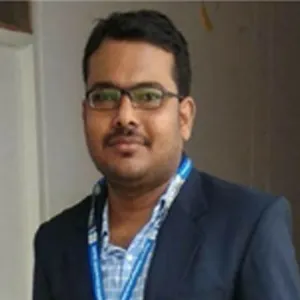

Mr. D. YESURAJA working as an Assistant Professor in the Department of Electrical & Electronics Engineering at Guru Nanak Institute of Technology, Hyderabad. He completed his B.Tech. in EEE from Karpagam University, in 2012, M.Tech. Power Electronics and derives from MIT college, Anna University in 2017. He has 6 years of teaching experience.
Mr.D.SREENADH REDDY Received B. Tech. degree in Electrical and Electronics Engineering from Audisankara College of Engineering and Technology, Gudrun.MTech in Integrated Power Systems from VNIT,Nagpur and pursuing Ph. D from JNTU, Anantapur. He is currently working as Assistant Professor in EEE Department of Guru Nanak Institute of Technology, Hyderabad. He has 13 years of teaching experience and 1 year of industrial experience. He has published 2 Scopus Indexed international journals, published 1 Patent. His research interests include Microgrids, Electrical vehicles and Energy Management.
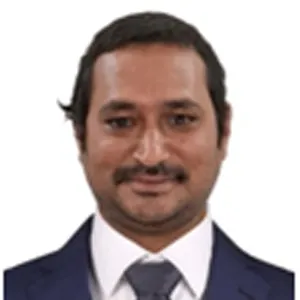
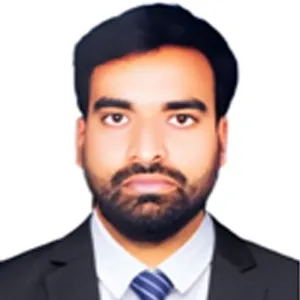
Dr. MALOTH NARESH is working as an Assistant Professor in the Department of Electrical and Electronics Engineering at Guru Nanak Institute of Technology, Hyderabad. He completed his Ph.D. degree and M. Tech in Department of Electrical Engineering, at MNNIT Allahabad, India, in 2021 and 2014 respectively and B. Tech in EEE from Indur Institute of Engineering and Technology, Siddipet, India, in 2012. His Research interests include power electronics application in Power System, renewable energy grid integration, power flow control and power quality issues in distributed generation system (Wind, Solar energy system) in DC-microgrids, control techniques in power electronics, analysis of wind power plants. He has published National, International journals and also published international conferences. He is also an active member of IEEE, Power Energy Society (PES), Industry Applications Society (IAS), Power Electronics Society (IAS) and Industrial Electronics Society (PES).
Mr. SREEKANTH MAMIDALA is working as an Assistant Professor in the Department of Electrical & Electronics Engineering at Guru Nanak Institute of Technology, Hyderabad. He completed his B.Tech. in EEE from Jawaharlal Nehru Technological University, in 2010, M. Tech. in Power Electronics, from Jawaharlal Nehru Technological University, in 2014, and pursuing his Ph.D.in EEE from Annamalai University, Tamilnadu. He has 12 years of teaching experience. He has published 3 international journals, published 5 patents and attended 30 seminars and workshops. His research interests include Renewable energy sources, Electric vehicles, Battery systems and Power electronics.
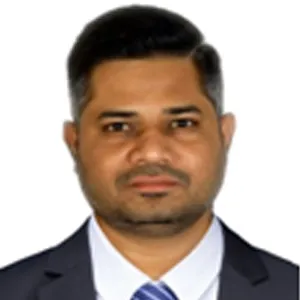

Mrs. P. HARIKA REDDY is working as an Assistant Professor in the Department of Electrical & Electronics Engineering at Guru Nanak Institute of Technology, Hyderabad. She completed her B.E. in EEE from Stanley college of engineering and technology for women in 2014,M.Tech in Power Electronics from Nishitha college of engineering and Technology in 2018 and pursuing her Ph.D. in EECE from GITAM University. She has 7 years of teaching experience. She has published 6 international journals. Her research interests include Battery management system, wireless charging, dynamic charging for Electrical Vehicles.
Mrs. BHUKYA ROJA is working as an Assistant Professor in the Department of Electrical and Electronics Engineering at Guru Nanak Institute of Technology, Hyderabad. She is received the Bachelor of Technology Degree in Electrical and Electronics Engineering from Swarna Bharathi Institute of Science & Technology (SBIT), Khammam, India, in 2016, the Master of Technology degree in Electric Power System from Kodada Institute of Technology & Science for Women, India, in 2019. Her research interests include power system, renewable energy grid integration and analysis of wind power plants.

Laboratories
Control Systems Lab
Control System applications are assuming an increasingly important role in the developing world, making it crucial for the students to be exposed to contemporary control system equipment in a realistic manner, in order to connect theoretical material taught in lecture courses with the realities of physical hardware and simulation through ‘higher-level’ technical computing language. To achieve the goal, Control Systems laboratory has been set up in Department of Electrical and Electronics Engineering to provide this realistic environment. This laboratory provides students with a test bed to learn and practice fundamental concepts of control systems. The lab has major equipment’s like AC servo motor, DC servo motor, Synchro transmitter and receiver, PID controller, Allen Bradley PLC, DC Generator and Motor, compensation network study trainer kit etc.
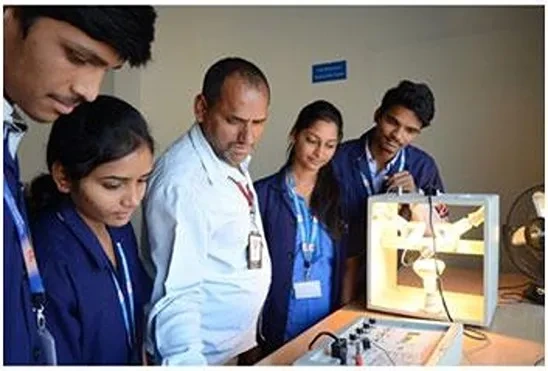
Power Electronics Lab
The power electronics lab enhances the EEE students by providing them the better understanding of the concepts and working of advanced power semiconductor devices and power electronics circuits. This lab also provides the platform for the UG students to perform and check their minor project, multi-disciplinary design and major project. The lab has equipment’s like SCR, MOSFET & IGBT, Single Phase AC Voltage Controller, Single Phase Cycloconverter, Single Phase series& parallel inverter, Single Phase Bridge inverter, DC Jones chopper, Single Phase dual converter, Three phase fully controlled converter
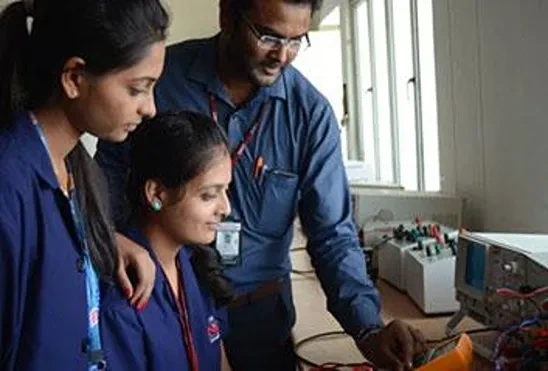
Electrical and Electronics Design Lab
Electrical And Electronics Design lab main aim is to enhance practical knowledge related to different subjects. To develop hardware skills such as soldering, winding etc. The Electrical Workshop is sufficiently outfitted with all the equipment’s and accessories for conducting practical classes in wiring practices as per BIS specifications. Models of modern switchgear and wiring accessories are deployed for the benefit of the students. The students are exposed to the current practices in domestic wiring and industrial installation, to increase ability for analysis and testing of circuits.
To give an exposure to market survey for available components.
To develop an ability for proper documentation of experimentation.
To enhance employability of a student.
To prepare students for working on different hardware projects.
The major lab equipment’s includes cut view of induction motor, contactors, star delta starter, DOL starter, MCB, ELCB, RCCB, MCCB, Regulated power supply with various capacity, precision rectifier, Peak detector, Zero crossing detector etc
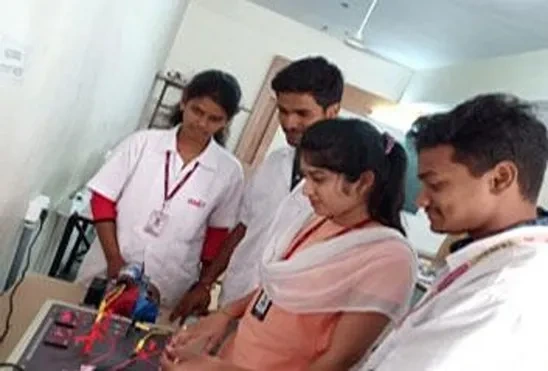
ELECTRICAL MEASUREMENTS & INSTRUMENTATION LAB
Electrical measurement laboratory is setup to supplement the theory course on electrical measurements and instrumentation This lab deals with different types of electrical bridges, determining the displacement-voltage characteristics of Linear Voltage Differential transformer(LVDT), measurement of three phase active and reactive powers, calibration of single phase energy meter etc. Through hands on experiments with real measuring equipment, students gain practical experience on LVDT, various types of measuring devices, current transformer and potential transformer. The lab is equipped with equipment’s like single phase energy Meter, dynamometer power factor meter, Crompton D.C. Potentiometer, Kelvin’s double Bridge, Schering bridge Anderson bridge, Calibration LPF wattmeter, Resistance strain gauge, Potential Transformer and Current Transformer.
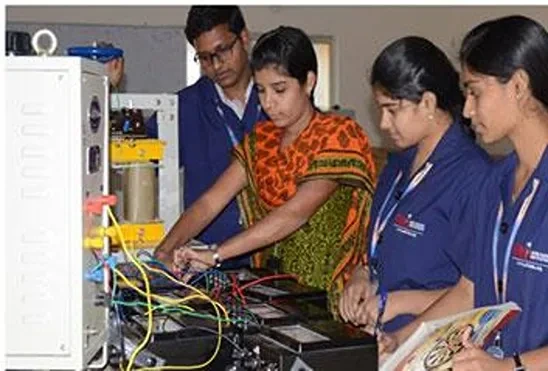
Power Systems Lab
Power system Laboratory comprises of protection, simulation, high voltage and machine related experiments. Facilities are available for over current, under voltage, directional, differential and distance relays including different numerical relays. Power systems lab main aim is to perform testing of CT, PT's and Insulator Strings to find sequence impedances of 3-Φ synchronous machine and Transformer to perform fault analysis on Transmission line models and Generators. Perform various load flow techniques. Understand Different protection methods. Analyze the experimental data and draw the conclusions. The major equipment’s in the lab includes, IDMT Over Current Relay. Differential protection of 1-Φ transformer, Over Voltage/Under Voltage relay, 3-Φ synchronous machine, 3-Φ Transformer, 3-Φ transmission line model.
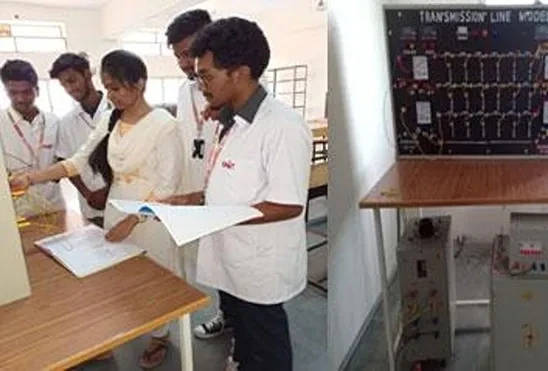
BASIC ELECTRICAL SIMULATION LAB
Basic electrical simulation lab main aim is to develop the simulation skills. To generate various signals and synthesis for the engineering systems. To analyze harmonics in the systems. To analyze electrical circuit in simulation environment. Basic Operations on Matrices Generation of various signals and sequences (Periodic and Aperiodic), such as unit Impulse, Step, Square, Saw tooth, Triangular, Sinusoidal, Ramp. Operations on signals and sequences such as Addition, Multiplication, Scaling, Shifting, Folding, Computation of Energy, and Average Power Mesh and Nodal Analysis of Electrical circuits Application of Network Theorems to Electrical Networks Waveform Synthesis using Laplace Transform Locating the Zeros and Poles and Plotting the Pole-Zero maps in S plane and Z-Plane for the given transfer function Harmonic analysis of non-sinusoidal waveforms
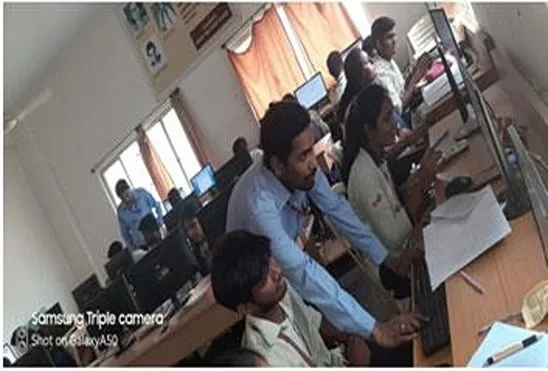
Electrical Machine – I Lab
This is our core set of laboratories, in terms of curriculum. Its overall needs are versatility and generality, in view of the many basic course needs it serves. This lab is general enough to hold a number of experiments suitable for giving students enough exposure to enable them to easily adopt experiments in more advanced laboratories in the department. Developing state-of-the-art machines and monitoring and diagnostics technologies to enable faster, greener ways to power, build and move the world.
Electrical machines lab main aim is To expose the students to the operation of DC Generator.
To expose the students to the operation of DC Motor.
To examine the self-excitation in DC generators.
To Start and control the Different DC Machines.
To assess the performance of different machines using different testing methods.
To Identify different conditions required to be satisfied for self - excitation of DC Generators and other DC machines.
The lab has equipment’s like DC shunt generator, DC series generator, DC compound generator, DC shunt machines and DC series machines.
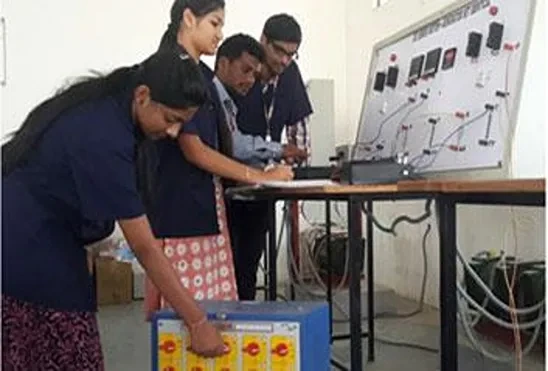
Electrical Circuits Lab
The significance of the Electrical Circuits Lab is renowned in the various fields of engineering applications. For an Electrical Engineer, it is obligatory to have the practical ideas about the Electrical Circuits. In the Electrical Circuit Lab students can create their own electrical circuits and do measurements on it. In the circuits the students can use resistors, light bulbs, switches, capacitors and coils. The circuits can be powered by a AC/DC power supply or batteries. There is an ammeter, voltmeter, wattmeter and an ohmmeter. The lab has equipment’s like Harmonic Analyzer, Digital Storage Oscilloscopes, RPS with different capacities and kits to perform most of the electrical and electronics circuits design and analysis.
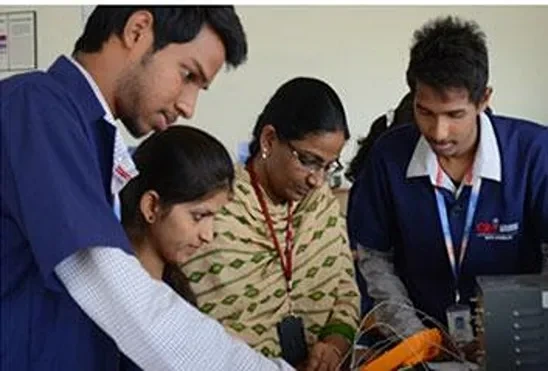
Electrical Machines – II Lab
This Lab Concerns with AC machines power, efficiency, characteristics of electrical machines as a motor, generator, determining the parameters and performance characteristics of transformer, methods of control of the speed of motor, control of the generator voltage etc. Through hands-on experiments with real machines, students gain practical experience on single phase and three phase transformers and machine drives. and also wide variety of practical experiments are performed here with combination of different rotating machines. The laboratory is also used for research activities in machines and to carry out project works on energy conversion. The lab equipment’s like Single Phase Transformer, three phase Induction motor, three –phase alternator, three—phase synchronous motor, single-phase induction motor, three-phase alternator etc.
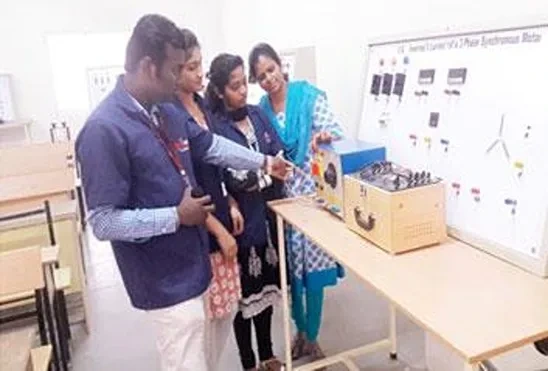
Basic Electrical Engineering Lab
The objective of Basic electrical and electronics engineering laboratory is to learn the practical experience with operation and applications electromechanical energy conversion devices such as DC machines, transformers, three phase induction motors and alternators. It also aims to get the knowledge of the different electronic devices like diodes, rectifiers, transistors and how these devices are used in real time applications. It also makes the students to learn how to measure the electrical quantities with different measuring devices and with CRO. The lab has equipment’s like DC Shunt motor, DC Compound Motor, Single Phase and Three Phase Transformers, regulated power supply, function generators, Three-phase Induction Motor, Three-phase Alternator etc.

Centre of Excellence
SOLAR APPLICATIONS LAB
The developed centre will concentrate on development of PV cell, module development and analysis of solar plant for various parameters that effect the generation. 200 KW Rooftop Grid Tied Solar PV Plant is established under special capital subsidy scheme of MNRE. Our purpose is to initiate a solar energy research laboratory with the objective to provide platform for graduate and under graduate students aware about application of solar energy in daily life and get engage in growth of renewable energy in our country. List of Equipment’s/ Instruments
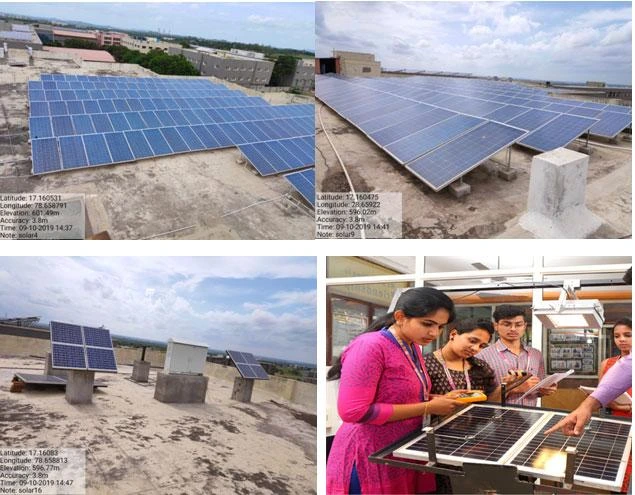
TLaboratory contains 1 KW power plant for experiment purpose with all other facility for erection and maintenance of solar power plant (Solar educational kit, Civil erection equipment, Electrical Appliances required for power plant etc).
Laboratory contains the solar application models like solar light, solar fan, solar battery charger, solar lantern, solar street light etc.
All other measurement facility require for the experimental purpose are existing.
Laboratory also contains safety tools required for solar power plant erection and maintenance.
Types of Facility Provided
- 200 kWp solar power-we have established a technology demonstrator station in two phases. It will supplement electricity requirement of campus during day time (8 hrs) and thus help in reducing dependence on grid power.
- Modules in the solar power station will be used for research and as test platforms for large scale solar energy technologies.
- We will initiate new and augment the existing programs for long term research & development in solar power generation, storage, distribution, management and policy making in the institute.
- This initiative will provide practical input for graduate and undergraduate teaching programs. In addition, it will provide training and human resource development in the area of renewable energy.
- We will also provide the plate form for students to get conscious about solar thermal systems like solar water heating, solar water cleaning, solar air heating, solar refrigeration, solar air conditioning, Solar energy storage systems, solar cooking etc.
Roll of Honour
| S. No | Academic year | Hall ticket Number | Name of the student | Percentage/CGPA |
|---|---|---|---|---|
| 1 | 2021-2022 | 18831A0225 | KANCHARLA ESHWAR CHANDRA VIDYA SAGAR | 8.1 |
| 2 | 2020-2021 | 18835A0214 | SHAIK RAHEEMUNNISA | 8.04 |
| 3 | 2019-2020 | 16831A0202 | AZMEERA AMRUTHA | 8.14 |
| 4 | 2018-2019 | 15831A0259 | VIKRAM REDDY ETTAM | 73.20% |
Topper List for AY 2022-23
| First Rankers | ||||
|---|---|---|---|---|
| 1 | II | EEE | 21831A0226 | P.SATHWIK |
| 2 | III | EEE | 21835A0208 | E.AKASH |
| 3 | IV | EEE | 19831A0225 | M.KOUNDINYA |
| 4 | IV | EEE | 20835A0218 | M.SRI HARSHA |
| Second Rankers | ||||
| 5 | II | EEE | 22835A0202 | AFSA TASNEEM |
| 6 | III | EEE | 21835A0211 | G.VASANTHA |
| 7 | IV | EEE | 20835A0208 | G.KUSHALI |
| 8 | IV | EEE | 20835A0204 | Ch. GEETHA KUMARI |
Topper List for AY 2021-22
| First Rankers | ||||
|---|---|---|---|---|
| 1 | II | EEE | 20835A0214 | K.SANDEEP |
| 2 | III | EEE | 19835A0202 | D.MAMATHA |
| 3 | IV | EEE | 17831A0219 | T.THARUN TEJA |
| Second Rankers | ||||
| 4 | II | EEE | 20835A0208 | G.KUSHALI |
| 5 | III | EEE | 19835A0211 | S.SAIRAM |
| 6 | IV | EEE | 18835A0210 | M.MANI TEJA |
Topper List for AY 2020-21
| First Rankers | ||||
|---|---|---|---|---|
| 1 | II | EEE | 20835A0214 | K.SANDEEP |
| 2 | III | EEE | 19835A0202 | D.MAMATHA |
| 3 | IV | EEE | 17831A0219 | T.THARUN TEJA |
| Second Rankers | ||||
| 4 | II | EEE | 20835A0208 | G.KUSHALI |
| 5 | III | EEE | 19835A0211 | S.SAIRAM |
| 6 | IV | EEE | 18835A0210 | M.MANI TEJA |
Student Achievements
II B.Tech. EEE
| SL. No | Name of the student | Achievement- Event name | Host Organization /Department |
|---|---|---|---|
| 1 | Ms. P Srivally | Featured in web story of India by inkzoid foundation on independence day | GNI |
| 2 | VARLE UMAKANTH | Got first prize in CIRCUITRIX | GNIT-EEE |
| 3 | BADAVATH SRIRAM | Winner at ARM wrestling | GNIT |
| 4 | T.Sathya Sree | First prize in poster presentation in National Energy conservation day under IIC Quarter 2 | GNIT-EEE |
| 5 | A Meghana | First prize in poster presentation in National Energy conservation day under IIC Quarter 2 | EGNIT-EEE |
| 6 | V.Mahider dora | First prize, Badminton | GNIT-NSS UNIT |
| 7 | karedla tirumala venkata surya tej | Participated in Cyber Surakshit and completed certification cose | Cisco networking academy |
| 8 | karedla tirumala venkata surya tej | Second prize in national science day(modal making) | GNIT |
| 9 | karedla tirumala venkata surya tej | Second prize in word puzzle | GNIT |
| 10 | karedla tirumala venkata surya tej | Best talented coordinator | Street Cause |
III B.Tech. EEE
| SL. No | Name of the student | Achievement- Event name | Host Organization /Department |
|---|---|---|---|
| 1 | K. Nikhil | NSS active participant | GNIT |
| 2 | Vinay Siddi | "Completed NPTEL courses on 1.machine learning with python 2.Basics of Java 3.Renewable energy and green building entrepreneurship 4.python for data science" | GNIT |
| 3 | R. THARUN SAI | NSS active participant | GNIT |
| 4 | ANIL KUMAR KUNCHALA | "NSS active participant Completed NPTEL courses on 1.C LANGUAGE 2. Basics of Java (Java Oops Feature)" | GNIT |
| 5 | P Likhith Rathod | Attended as a deligate in Meluha MUN (DISEC) | |
| 6 | Bandari vinay | Certification course on Basics of python(Infosys- SpringBoard) | Infosys spring board at GNIT |
| 7 | Kamatham Venkatesh | "Completed certification courses on 1) Electrical vehicle workshop 2) python for beginners" | "Skill up program B.V. Raju Institute of Technology" |
| 8 | Kasala Aakanksha | Completed certification program on Hybrid vehicle | Tech fest IIT Bombay |
| 9 | Kasala Aakanksha | Participated in Workshop on Data Analytics in Management Sciences using SPSS | |
| 10 | Kasala Aakanksha | Participated in Idea presentation under IIC council 5.0. | EEE GNIT |
| 11 | KATHUROJU AKASH | Completed a certification course on Basics of Java (Java Oops Feature) | GNIT |
| 12 | Basics of Java (Java Oops Feature) | Completed a certification course on Basics of Java (Java Oops Feature) | GNIT |
| 13 | Praveen Kumar bagam | Completed a certification course on Basics of Java (Java Oops Feature) | GNIT |
| 14 | ERUVA AKASH | Winner for best idea as a part of Institutions Innovation Council Completed a certification course on Basics of Java (Java Oops Feature) | GNIT |
| 15 | sumanth jamalpur | Completed a certification course on agile methodology | GNIT |
| 16 | Akhila Malothu | Participated in Socially point India | GNIT |
IV B.Tech. EEE
| SL. No | Name of the student | Achievement- Event name | Host Organization /Department |
|---|---|---|---|
| 1 | Ch.Geetha Kumari | First prize in Technical quiz in Energy conservation day under IIC | EEE GNIT |
| 2 | k.sandeep | ||
| 3 | N. Sai priya | ||
| 4 | M.Sriharsha | Research and Development (R&D) Program | INDUCE |
| 5 | Panthangi sandeep | Cricket" And "NSS REGULAR SERVICE | GNIT |
Departmental Clubs
Women Empowerment cell To deal with all aspects related to women empowerment
Energy club To motivate the students towards technical growth
Activities conducted
The department conducted various programmes such as “National Energy Conservation Day” , “Creative Thinking on Innovation” in association with Energy Club and a motivational seminars like “Gift Yourself-Motivational program for women”
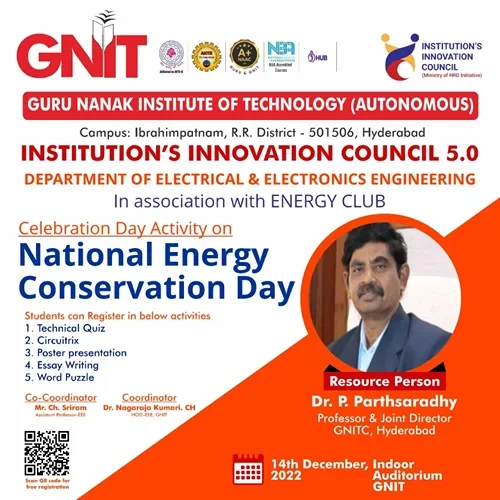
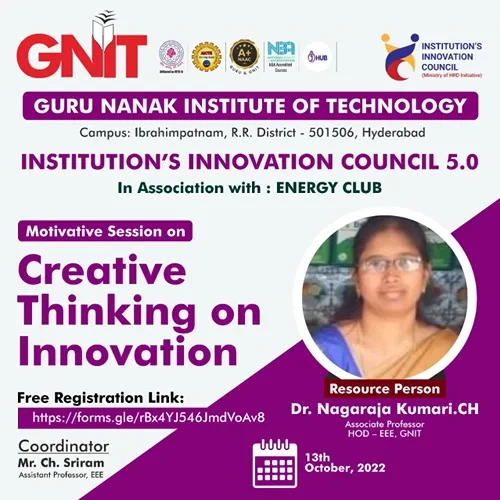
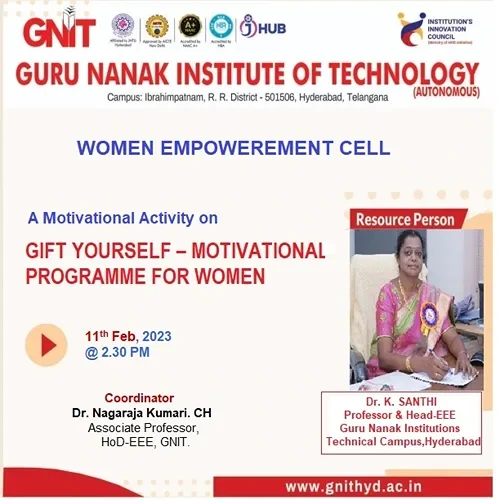
Departmental Events
| S. No. | Workshop Tittle | Dates | Resource Person |
|---|---|---|---|
| 1 | Introduction to MATLAB | 18-19 Sep, 2020 | Dr. Sandeep Gupta, Assistant Professor, JECRC University Rajasthan |
| 2 | Electrical Safety | 12-13 March, 2021 | Dr. MD. Khursheed, Professor, Integral University Lucknow) |
| 3 | How we can overcome adversities in designing Electric Vehicle | 27 August, 2021 | Dr. Ravi Prasad Naidu, NEC, Gudur, Nellore |
| 4 | Developing online Repository of Proof of Concepts (PoCs) Developing | 11-12 Feb, 2022 | Mrs. Khushboo Purwar Assistant Technical Manager, QUARBZ Info Systems, Indian partner of Typhoon HIL, Kanpur |
| 5 | Solar Applications | 12-13 August, 2022 | Dr. Akhilesh Kumar Gupta Assistant Professor, BNCET, Lucknow |
| 6 | Fundamentals of Electric Vehicle | 17-18 Feb, 2023 | Dr. Ravi Prasad Naidu, NEC, Gudur, Nellore |
| 7 | Energy Audit | 22-23 March, 2024 | Dr. M Surendra Babu Associate Professor, Anurag University |
| S. No. | Name of the topic | Resource Person | College Name | Dates | No. of Participates | ||
|---|---|---|---|---|---|---|---|
| From | To | Staff | Students | ||||
| 1 | Entrepreneurship Development in Competitive Environment | Dr. B. Madhusudhan Reddy, Professor, MBA. | GNIT | 2/15/2023 | 2/15/2023 | 3 | 54 |
| 2 | Achieving Problem-solution fit and Product-Market fit | Dr. B. Santhosh Kumar, Professor, CSE | GNIT | 2/7/2023 | 2/7/2023 | 3 | 57 |
| 3 | Celebration Day: National Energy Conservation Day (India) | Dr. P. Parthasaradhi, Professor. | GNIT | 12/14/2022 | 12/14/2022 | 5 | 85 |
| 4 | Institutional Idea Hackathon, 17 teams participated and 6 ideas are selected and awarded. | Dr. Nagaraja Kumari CH , Head of EEE. | GNIT | 11/24/2022 | 11/24/2022 | 2 | 57 |
| 5 | Journey from Innovation to Entreprenuership | Dr. R. Dhanasekharan, Professor. | GNIT | 11/21/2022 | 11/21/2022 | 2 | 58 |
| 6 | Creative Thinking on Innovation | Dr. Nagaraja Kumari CH, Head of EEE. | GNIT | 10/13/2022 | 10/13/2022 | 3 | 45 |
| 7 | New Innovation or innovative ideas in power electronics | Dr. Akhilesh Kumar Gupta, Assistant Professor | BNCET, Lucknow | 8/8/2022 | 8/8/2022 | 3 | 50 |
| 8 | Innovation on Green Innovative Ideas and Critical thinking of power quality | Dr. Pradeep Kumar, Assistant Professor | NIT, Haryana | 8/2/2022 | 8/2/2022 | 3 | 65 |
| 9 | Engineering Entreprenuership: Business Ideas and tools | Dr. Sanjeev Shrivastava, Professor | GNU | 8/4/2022 | 8/4/2022 | 4 | 75 |
| 10 | Poster Presentation of Startups developed and linkage with innovation ambassadors for mentorship support | Dr. B. Santhosh Kumar, Professor, CSE | GNIT | 8/6/2022 | 8/6/2022 | 3 | 45 |
The following activities were conducted exclusively for the EEE students under IIC activity during 2021-22
| 1 | Power Quality Issues in Modern Power System: Opportunities and Challenges | Dr. Pradeep Kumar, NIT, Haryana | 2/15/2022 | 54 |
| 2 | "Developing online Repository of Proof of Concepts( PoCs ) developed and way forward plan" | Ms. Khushboo Purwar, uatrz Info Systems. Kanpur | 2/11/2022 | 55 |
| 3 | Opportunities in Power Electronic Converters based on RES and its Applications | Dr. Akhilesh Kumar Gupta, BNCET, Lucknow. | 2/12/2022 | 57 |
| 4 | National Energy Conservation Day (India) | Dr. P. Parthasaradhi, Professor, GNITC. | 12/14/2021 | 74 |
| 5 | Visit to 132/33/11 kV Sub Station | Mr. R. Saidhulu, ADE, Ibrahimpatnam. | 11/27/2021 | 55 |
| 6 | Entrepreneurship Oppurtunities in Electrical Domain | Dr. Saneev Shrivastava, Professor, GNU | 11/25/2021 | 62 |
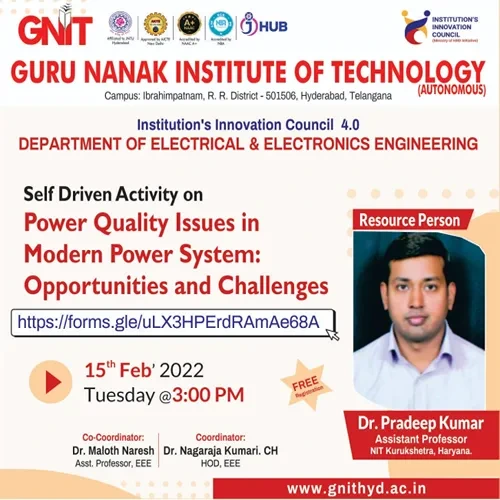
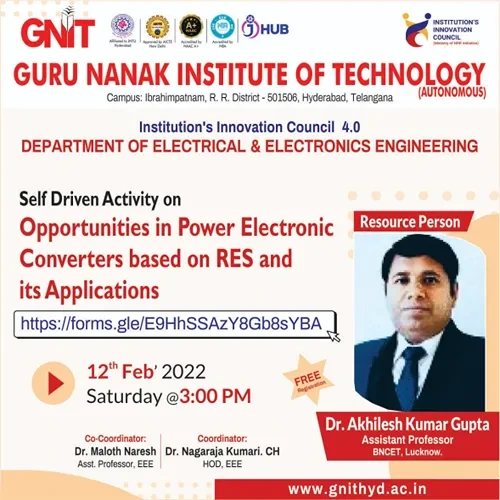
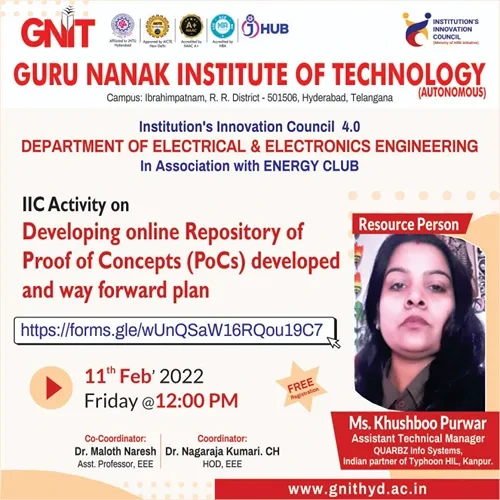
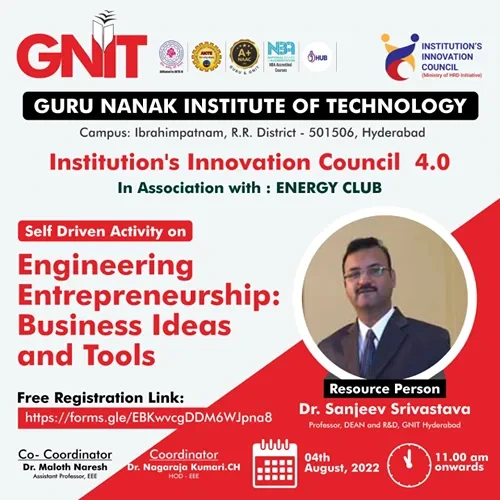
Seminars
| S.No. | Seminar Tittle | Dates | Resource Person |
|---|---|---|---|
| 1 | Professional Ethics | 06 Feb, 2021 | Dr. N Surendra Babu Associate Professor Anurag University |
| 2 | Professional Ethics | 05 Feb, 2022 | Dr. Umesh Kumar Soni, Assistant Professor, AKS University, Satna |
| 3 | Professional Ethics | 08 Feb, 2023 | Dr. Sandeep Gupta, Associate Professor, JECRCUniversity Rajasthan |
| 4 | Research Methodology | 06 October, 2023 | Dr. Umesh Kumar Soni Assistant Professor AKS University, Satna |
| 5 | Professional Ethics | 09 Feb, 2024 | Dr. P Parthasarathy Professor GNITC |
Coming Soon...
FDPs/ Workshops
|
2020-2021 |
|||
|
S.N0 |
FDP Tittle |
Dates |
Resource Person |
|
1 |
Recent Trends in Electric Vehicle
Design and Simulation tools |
18-21 May, 2021 |
Dr. Ravi Prasad Naidu Principal NEC, Gudur, Nellore |
|
2 |
Assessment Strategies in Outcome-Based
Education |
12-14 August, 2020 |
Dr. ASS Murgan Associate Professor CVR College of Engineering |
|
3 |
Ethics to be followed while writing a
Research Paper |
5 January, 2021 |
DR. K Vinay Kumar, Professor, Chaitanya (Deemed to be University),
Hyderabad |
|
2021-2022 |
|||
|
1 |
Design of Controller Using FPGA |
13-14 October, 2021 |
Dr. Maloth Naresh GNIT |
|
2 |
Faculty Role in Achieving OBE Goals |
10-12 February, 2022 |
Dr. D Obuleshu Associate Professor CVR College of Engineering |
|
3 |
Developing Ethical Awareness in Engineering
Students |
6 May, 2022 |
Dr.
K.V.N.S Pavan Kumar, Professor, Chaitanya (Deemed to be University),
Hyderabad |
|
2022-2023 |
|||
|
1 |
Integration of Renewable Energy
Systems - Research Tools |
06-10 July, 2022 |
DR. K Vinay Kumar, Professor, Chaitanya (Deemed to be University),
Hyderabad |
|
2 |
Designing Curriculum for Outcome-Based
Education |
16-18 November, 2022 |
Dr. ASS Murgan Associate Professor CVR College of Engineering |
|
3 |
Role of Ethics in Engineering Design
and Innovation |
10 February, 2023 |
Dr.
K.V.N.S Pavan Kumar, Professor, Chaitanya (Deemed to be University),
Hyderabad |
|
2023-2024 |
|||
|
1 |
Outcome Based Education and
Accreditation |
09-11 March, 2023 |
DR. K Vinay Kumar, Professor, Chaitanya (Deemed to be University),
Hyderabad |
|
2 |
Ethical Issues in Engineering Research
and Development |
15 November, 2023 |
Dr.
K.V.N.S Pavan Kumar, Professor, Chaitanya (Deemed to be University),
Hyderabad |
The department exclusively conducted an Internal Faculty Development Program on Design of Controllers Using FPGA from 13th to 14th October 2021
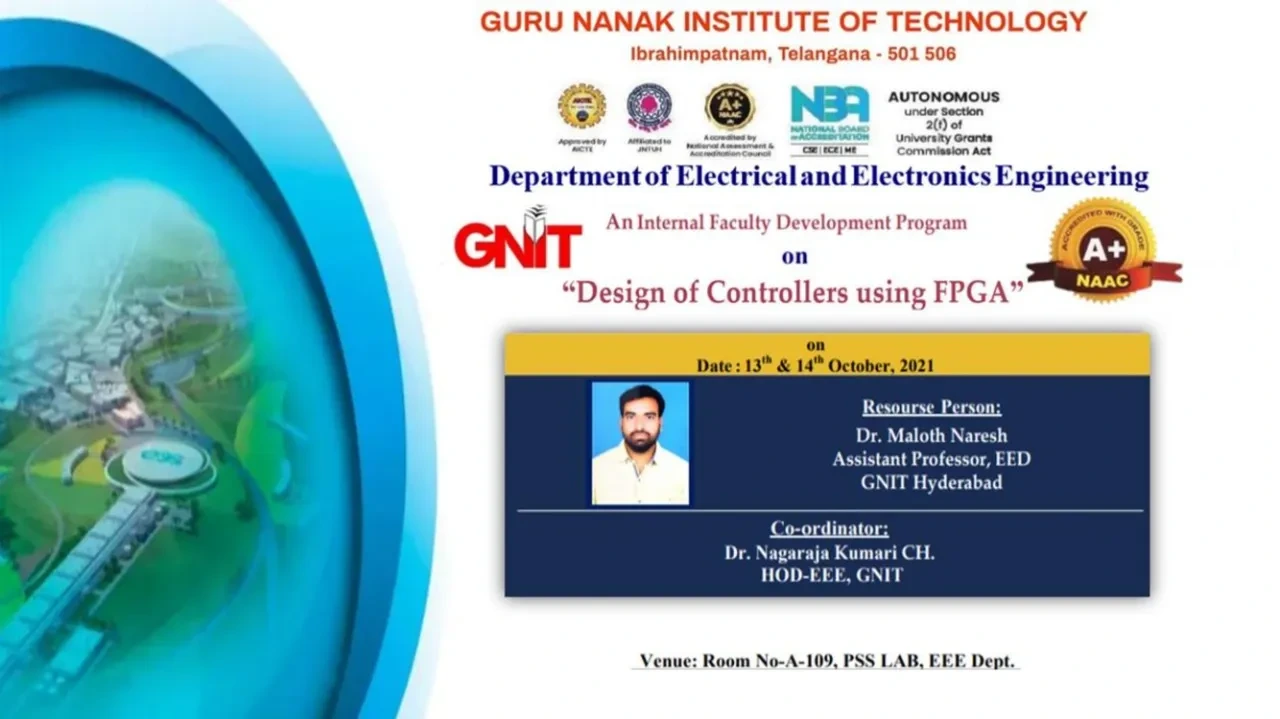
1) INDUSTRIAL VISIT TO RR POWER TECHNOLOGIES
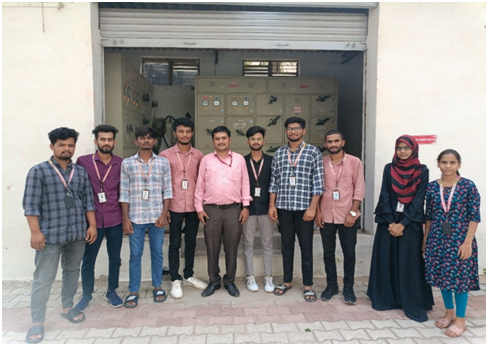
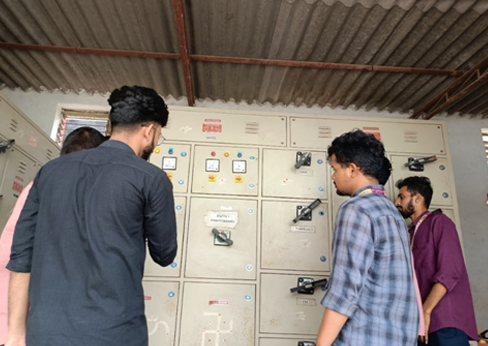
2) INDUSTRIAL VISIT TO CPRI
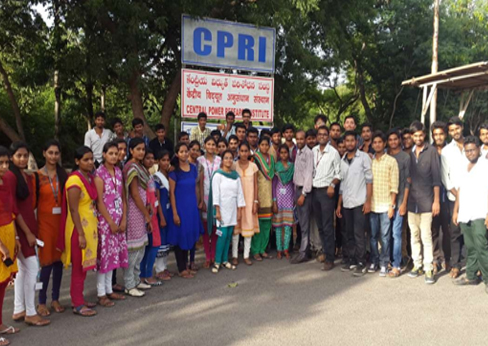
3) INDUSTRIAL VISIT TO 400KV SUBSTATION AT MAMIDIPALLI.
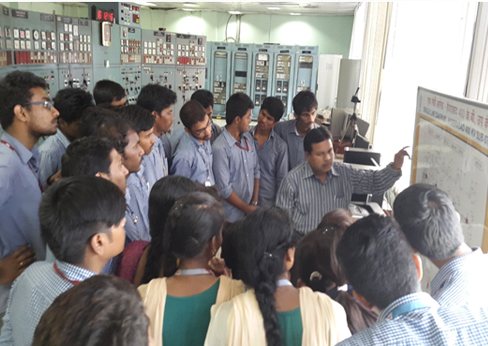
Industrial Field Visit
The department organized an field visit on the concept of “Exposure and problem identification” at 132/33/11 KV Sub-Station , Ibrahimpatnam on 27-11-2021 as a part of IIC activity
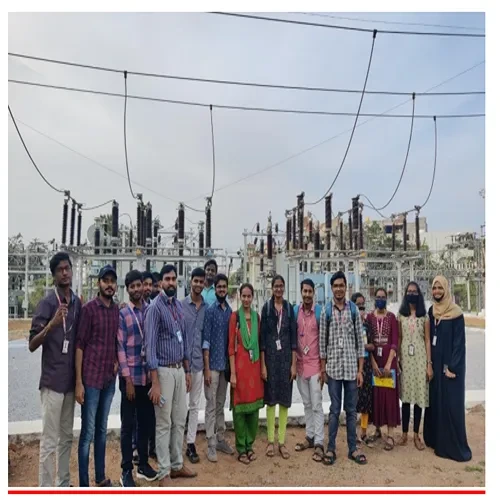
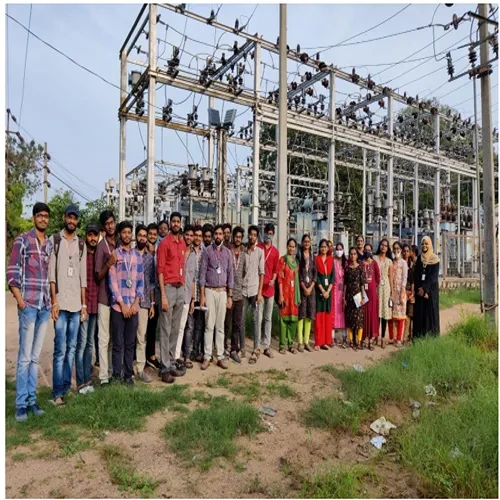
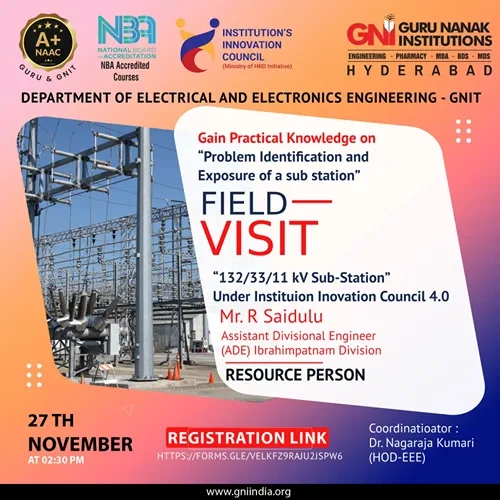
|
2020-21 |
||||
|
S. No |
Gap |
ActionTaken |
Date- Month-Year |
ResourcePersonwithDesignation |
|
1 |
ElectricVehicle |
A webinar on “Simulationof Electric
Vehicle usingMATLAB Simulink” |
09/09/2020 |
ASrinivas,Faculty,PantechLearning,Hyderabad.. |
|
2 |
SolarEnergy |
A webinar on
“MajorComponents and Designparametersfor RooftopSolarPower Plant” |
04/10/2020 |
Dr.Kuldipsingh,VP-Operations
,Sureenergysystems pvtltd. |
|
3 |
Design of
ElectricMotors |
A webinar on
“SimulationDrivenApproachfor Designing of ElectricMotors” |
22/10/2020 |
Mr. Sandeep
Ramagiri, AltairEngineeringpvtltd. |
|
4 |
CombinationalLogic Design andSequential Logic Design,Timing Analysis |
A Guest lecture
on“combinational logicdesignandsequential logicdesign,Timing analysis” |
10/11/2020 |
Dr. I.
SharathChandra, AssociateProfessor, Matrusri Engineering College, Hyderabad. |
|
5 |
Applications ofBLDC Motors |
Guest lecture
on”ApplicationsofBLDC Motors” |
20/11/2020 |
Dr. J Vara
Prasad,Associate Professor CHRIST School of Engineering and Technology. |
|
6 |
Recent Trends inElectricalEngineering |
A webinar on “ RecentTrends in
ElectricalEngineering” |
28/12/2020 |
Dr.RanjitKumar,Professor,JITS,Warangal |
|
7 |
RenewableEnergy |
Guest lecture
on”RenewableEnergy” |
26/03/2021 |
Dr.KuldipSingh,SureEnergyPvt. Ltd. |
|
8 |
Wind PowerGrowth
andOpportunitiesin India |
Guest lecture on” WindPower Growth
andOpportunitiesinIndia” |
16/04/2021 |
Dr. V.
Mahesh, Associate Professor, RVR &JC College of Engineering, Guntur, AP. |
|
9 |
Power Quality:Issues andSolutions |
Guest lecture on” PowerQuality: Issues
and Solutions” |
30/04/2021 |
Dr.M.Anitha,
Assoc. Prof, RVR &JC College of Engineering, Guntur, AP. |
|
10 |
Electrical Safetyand EnergyManagementin LightingSystems |
Guest lecture on“Electrical Safety and
EnergyManagementinLighting Systems” |
07/05/2021 |
Dr.
ChandraguptaMauryan, Associate
Professor, GNITC, Hyderabad, TS |
|
2021-22 |
||||
|
S. No |
Gap |
ActionTaken |
Date-Month-Year |
ResourcePersonwith Designation |
|
1 |
SuperpositionTheorem,Thevinins theorem |
Workshopon“NetworkTheorems” |
26/10/2021 |
Dr.P.SARALA
Assoc.Prof, Malla Reddy Engineering
College(Autonomous), Kompally, Hyderabad, Telangana. |
|
2 |
Analysis ofBJT,FET,and simulation ofdigital circuit
scouldhavebeen included |
Conducted workshop
onAnalysis of BJT, FET,andsimulationofdigitalcircuits” |
05/11/2021 |
Dr.NSureshProfessor&
HOD, Sphoorthy College of Engineering, Nadergul
Hyderabad, Telangana. |
|
3 |
CycloConverters |
A Guest lecture on“CycloConverters” |
19/11/2021 |
Dr.KHariKrishna,Professor, EEE Dept., Kallam Haranadhareddy Institute of
Technology, Guntur, Andhra Pradesh. |
|
4 |
Entrepreneurship Opportunitiesin ElectricalEngineering |
A Webinar
on"EntrepreneurshipOpportunities inElectrical EngineeringDomain" |
25/11/2021 |
Dr.SanjeevSrivastavaProfessor,DEAN
(Academics and R&D)GNITHyderabad |
|
5 |
Fieldvisit |
Field visit on Exposureand problemidentification
in132/33/11KVSub- station |
26/11/2021 |
R. Saidulu, Assistant divisionalEngineer,
Ibrahimpatnam |
|
6 |
SpecialElectrical
Machines |
Guestlectureon “SpecialElectrical
Machines” |
23/12/2021 |
Dr.N.Chaithanya, Assistant Professor, Assistant Professor, RVR
&JC College of Engineering, Guntur, AP. |
|
7 |
Automation
andAdvancedProgramming inPLCand SCADA |
Guest lecture”Automation
andAdvanced ProgramminginPLCandSCADA” |
15/04/2022 |
Dr.N.V.PhanendraBabu,Assistant
Professor, CBIT, Hyderabad. |
|
8 |
Simulation ofElectroniccircuits
usingMATLAB |
Workshop on
”Simulation of Electroniccircuits usingMATLAB” |
13/05/2022 |
Dr. D. RaviKumar,AssistantProfessor, Professor, ECE Dept. Shadhan College of Engineering and
Technology. |
|
2022-23 |
||||
|
S.No. |
Gap |
Actiontaken |
Date-Month- Year |
ResourcePersonwithdesignation |
|
1 |
PowerSystemsOptimization |
AGuestlectureon”TheRole
of ArtificialIntelligenceinPower SystemsOptimization” |
28/10/2022 |
Dr. K.V.N.S Pavan
Kumar,AssociateProfessor,ChaitanyaDeemedto beUniversity |
|
2 |
Smart GridTechnologies |
A Guest
lecture on"Smart GridTechnologiesandTheirImpacton Power Systems" |
02/11/2022 |
Dr. Mahesh babu Nakka,
MallaReddyUniversityHyderabad |
|
3 |
ControlTechniquesinPower Electronics |
A Guest
lecture on“ControlTechniquesinPowerElectronics Systems” |
16/11/2022 |
Dr.ShivajiB,AssistantProfessor,
KITS women’s college, Kodada. |
|
4 |
Speedcontrolofspecial
motorsand itsapplication |
A Guest
lecture on“Speed control ofspecialmotorsanditsapplication” |
25/11/2022 |
Dr.M.NarendharReddyAssociate Professor,SPHN,Hyderabad |
|
5 |
RecentTechniques
inelectrictraction |
A Guest
lecture on”RecentTechniquesinelectrictraction” |
30/11/2022 |
Dr. Kasi Rama Krishna
Reddy Ch,AssistantProfessor, Vasavi College of Engineering, Hyd. |
|
6 |
RecentAdvances
inProtectionand Switchgear |
Guest
lecture on“RecentAdvancesinProtectionand Switchgear |
07/12/2022 |
Dr.M.Maheshwari,Professor. University
of Technology and and Applied Sciences of Oman. |
|
7 |
PowerFactorCorrection Techniques |
AGuestlectureon “Power FactorCorrectionTechniques
inPowerElectronics" |
23/12/2022 |
Dr.J.UdayBhaskar,Professor,MallareddyEngg. College,
Hyd. |
|
8 |
Control Strategies in Power Semiconductor Drives |
A Guest lecture on "Control Strategies in Power Semiconductor Drives" |
27/01/2023 |
Dr. Y.V. Balarama Krishna Rao, Professor and HoD
EEE, GNITC |
|
9 |
Emerging Trends in Electrical Machines |
A Guest lecture on “Emerging Trends in
Electrical Machines: Towards Higher Efficiency and Sustainability" |
10/02/2023 |
Dr. Hari Krishna, Professor, Kallam Harinadha Reddy Engineering
College |
|
10 |
Electric
Vehicle Integration |
A Guest lecture on “Electric Vehicle
Integration and Its Implications on Power Systems" |
14/02/2023 |
Dr. M. Maheshwari, Professor, University
of Technology and and Applied Sciences of Oman. |
|
11 |
Control
Techniques in Power Electronics |
A Guest
lecture on "Control Techniques in Power Electronics Systems" |
01/03/2023 |
Dr. Kasi Rama krishnareddy Ch, Assistant Professor,
Vasavi College of Engineering, Hyd. |
|
12 |
Challenges
and Opportunities in the Future of Electrical Machines |
A Guest
lecture on “Challenges and Opportunities in the Future of Electrical
Machines" |
10/03/2023 |
Dr. Dilip, Associate Professor, St.
Peters Engg. College, Hyd. |

